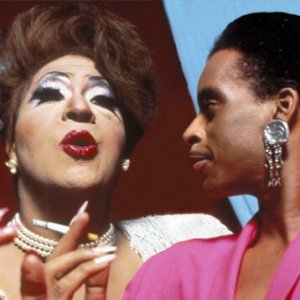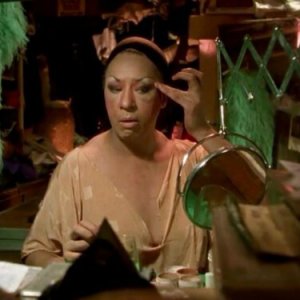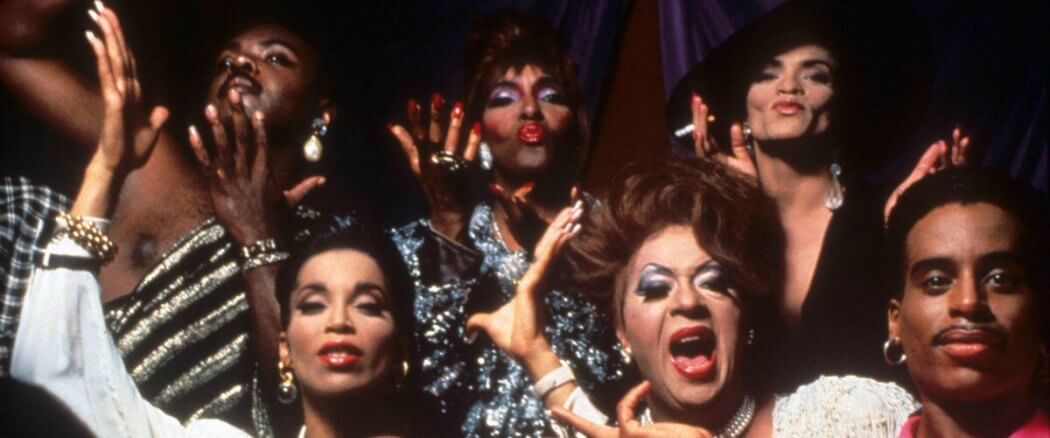Paris is Burning struck its match when director Jennie Livingston was walking through Washington Square and stopped to watch a group of young men voguing. They invited her to a drag ball. At the time Livingston was “sniffing around” for a documentary subject, but once she got a noseful of the ball, she got addicted.
7 years and 10 months of filming and editing later, the trip ended – a maiden voyage, really, in every sense of the phrase. If Paris has an arc, it is so enormous, so full of fiercely and wonderfully made creatures, I could not hope to harbor it. But here’s hoping.
A Glorious Poem
Paris takes place, naturally, in New York. It’s a city where, as recent transplant Taylor Swift penned, “Everybody was someone else before.” The citizens of Paris live that lyric. And like Cinderella, they live for the ball.
 Livingston eulogizes the drag ball as “a sort of glorious poem about the possibilities of transformation. A poem set in dance and costume and verbal wit that’s akin to something by Walt Whitman or Langston Hughes.” More specifically, it is a kind of underground fashion week that lasts all year, a circuit in various community centers all over the country. More specifically, there is a runway and trophies for the winners of myriad categories, including Schoolboy/Schoolgirl, Military and Executive. More specifically, the purpose is to achieve “realness” – the ability to blend, to be undetectable as gay, or lesbian, or transgendered. Culture is specificity.
Livingston eulogizes the drag ball as “a sort of glorious poem about the possibilities of transformation. A poem set in dance and costume and verbal wit that’s akin to something by Walt Whitman or Langston Hughes.” More specifically, it is a kind of underground fashion week that lasts all year, a circuit in various community centers all over the country. More specifically, there is a runway and trophies for the winners of myriad categories, including Schoolboy/Schoolgirl, Military and Executive. More specifically, the purpose is to achieve “realness” – the ability to blend, to be undetectable as gay, or lesbian, or transgendered. Culture is specificity.
“Social roles [are] drag,” declares Livingston. “When I would come out of one of the drag balls, which, you know, were generally supposed to begin around midnight, but usually began at 3 in the morning and went ‘til afternoon, I’d walk out on the street, and after having seen the incredible array of transformations – gender transformations, social transformations…it just looked to me like everyone on the street was participating in a parade. The world was a pageant.”
Queer Castoffs
“The film contains an irony that the ballwalkers are imitating a society where they are rejected, but that isn’t the film’s main point about the ball world or the people in it,” Livingston asserts. “At its heart, this is a portrait of a group of people who, however oppressed and marginalized, refuse to be confined or defined by marginal treatment.”
Such treatment necessitated the founding of houses; or, more accurately, orphanages, since they became a catchall for the queer castoffs who would become belles of the ball. One interviewee calls them “gay street gangs,” but the mother of LaBeija House, Pepper, elucidates with more sensitivity: “When someone has rejection from their mother and father, their family, and they get out in the world, they search. They search for someone to fill that void.”
Throughout the ‘80s, that void was huge and growing, like spilled black paint. The liberation movement, while extraordinary, could not upend a topsided system. An enigmatic disease dubbed “gay cancer” was devouring the community, compounding shame and deepening stigmatization. The church viewed gay people as infectious – morally and literally. And, as always, the kids were in flight. From families that misunderstood, or abused, or ignored.
“I remember my dad, he said ‘You have three strikes against you in this world,’” shares a ballgoer, in the opening moments of the film. “‘Every black man has two. That they’re just black and they’re male. But you’re black, and you’re a male and you’re gay. You’re going to have a hard fucking time.’ He said, ‘If you’re going to do this, you’re going to have to be stronger than you ever imagined.’”
My Own Special Creation
The strength on display in Paris is truly unimaginable, and yet, that is its source: an imagination that “I am what I am, I am my own special creation,” as one post-op ballwalker sings, channeling another survivor, Gloria Gaynor.
 Such sentiment may indicate, to some, individualism at best and godlessness at worst, but it is really a bandage fashioned from a wound; spurned in one’s original form, one covers it with performance, even burlesque – in the traditional definition of extravagant parody. “Indeed the act of embracing one’s stigma is never merely a psychological maneuver,” writes Michelle Alexander. “It is a political act – an act of resistance and defiance in a society that seeks to demean a group based on an inalterable trait.”
Such sentiment may indicate, to some, individualism at best and godlessness at worst, but it is really a bandage fashioned from a wound; spurned in one’s original form, one covers it with performance, even burlesque – in the traditional definition of extravagant parody. “Indeed the act of embracing one’s stigma is never merely a psychological maneuver,” writes Michelle Alexander. “It is a political act – an act of resistance and defiance in a society that seeks to demean a group based on an inalterable trait.”
Society is a primary concern of Livingston, in particular “the promise of liberty and equality that’s made to every American…if we work hard enough, we’ll be successful, we’ll be honored, we’ll be happy…Each of us is promised liberation and transformation. But the promise is not evenly kept.”
Prophetic Imagination
“In real life you can’t get a job as an executive unless you have the educational background and the opportunity,” explains the drag queen of philosophers, Dorian Corey, looking like the love child of Mae West and Divine. “Now the fact that you are not an executive is merely because the social standing of life…Black people have a hard time getting anywhere, and those that do are usually straight. In a ballroom you can be anything you want…you’re showing the straight world that I can be an executive. If I had the opportunity, I could be, because I can look like one. And that is like a fulfillment.”
Fulfillment is exactly correct. The drag ball is a flash of prophetic imagination, a belief blower of incredible volume and power, blasting that I am an icon – cracked, but bearing resemblance to the Artist, and worthy of love – or, at least, no less worthy than anyone else.
My sponsor once asked, in the spirit of Brennan Manning, “How would you behave if you believed you were loved? Unconditionally, unequivocally, unendingly loved?” That question hovers over the deep waters of my heart sometimes. Especially when I watch the beautiful children playing dress up in Paris. What if families, friends, neighbors, strangers, if all of us, with whom God entrusted His telegram of LOVE <STOP> really delivered?
There might not be, as Fran Lebowitz, author and ball judge remarks, quite so much “institutionalized showing off.” But I think it would still be a ball – to which everyone was invited – to be real.





